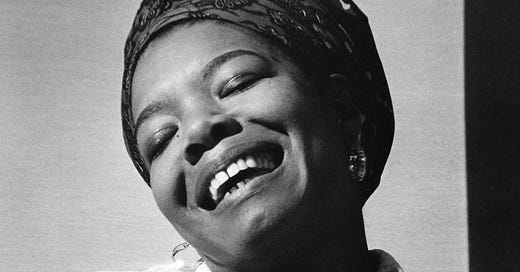I’d always known who Maya Angelou was but I never read her work for myself. I remember my Nana gave me her copy of The Heart of a Woman and thinking "Why haven't I heard of this book?” Most are familiar with I Know Why the Caged Bird Sings, including myself but I can only remember the title alone at the moment. Although I'm not familiar with the literary works of this marvelous woman, I felt like I walked with her through the highs and lows of her life after reading Letter to my daughter. When I ordered this book, I was expecting pages of advice on life, love, and happiness but I got a synopsis of Angelou’s life instead {which actually may have been better}. This novel is a relatively short read but two chapters struck such a chord with me that I remember them a month after closing the book.
#1. Angelou recants a romantic relationship* that quickly turned on its head. She's beaten, kidnapped, and held hostage. Luckily, her mother finds her - thank God - but while she's telling readers this story she mentions that she begins to pray while the kidnapper steps out to the corner store. As he goes to get in his car, the cops arrest him because he has a pack of cigarettes that were stolen from a vendor’s truck earlier that day. Though he didn’t steal merchandise from a tobacco truck he stole much from Angelou.
* I should elaborate that the kidnapper got Angelou alone under the guise of a date under a starry night sky. He insinuated that she was cheating on him and then beat her. Each time she came to her senses, he knocked her unconscious. He took her to his place, after showing her bloodied and beaten body to his so-called friends, then cried tears and pleas of his love for her. He mentioned killing himself and proceeded to say he couldn’t leave Angelou behind for someone else to have her. He’d held a razor blade to her throat then changed his mind and offered to get her juice after realizing she’d had eaten for three days.
#2. Angelou is visiting Morocco for the first time and exploring a local area when a group of natives invite her over to their tent. They offer her a cup of coffee and as she drinks she feels a roach on her tongue. She’d seen bugs crawling around on the ground seconds ago, so she makes that connection. Even though she wants nothing more than to spit it out, she imagines how disappointed her grandmother would be if she did such a thing. So she maintains her composure and finishes the drink. When she’s out of their point of view though, she rounds the nearest corner, grips the wall, and vomits. Those four roach raisins left her sick for a month.
Later on, while thumbing through Reader’s Digest she learns that African tribes who stick to the traditional routes when traveling through African countries rely on the bartering system as opposed to money. With the little money they do have however, they buy raisins. They place three to five raisins in a cup of coffee to honor visitors and show respect. Angelou immediately feels embarrassed by her inner reaction to the coffee she was offered earlier that month.
“... they had chosen to honor me with those expensive raisins … I began this lifelong lesson. If a human being eats a thing, and if I'm not so violently repelled by my own upbringing that I cannot speak, and if it is visually clean within reason, and if I'm not allergic to the offering, I will sit at the table and with all the gusto I can manufacture I will join in the feast.”



